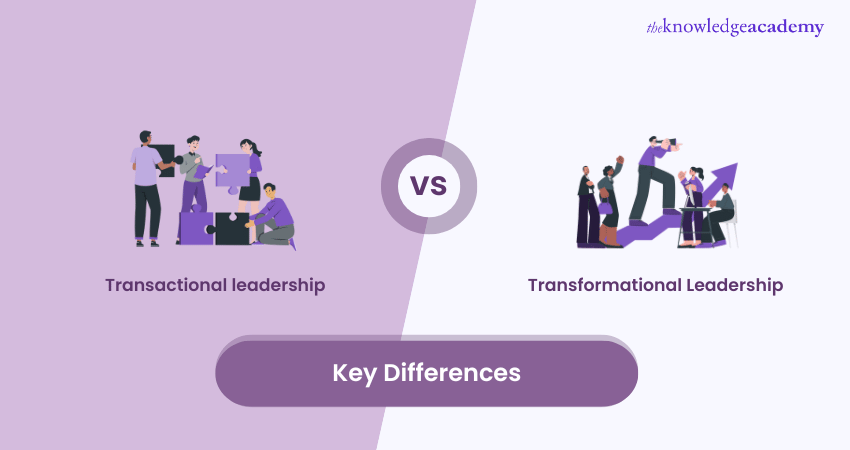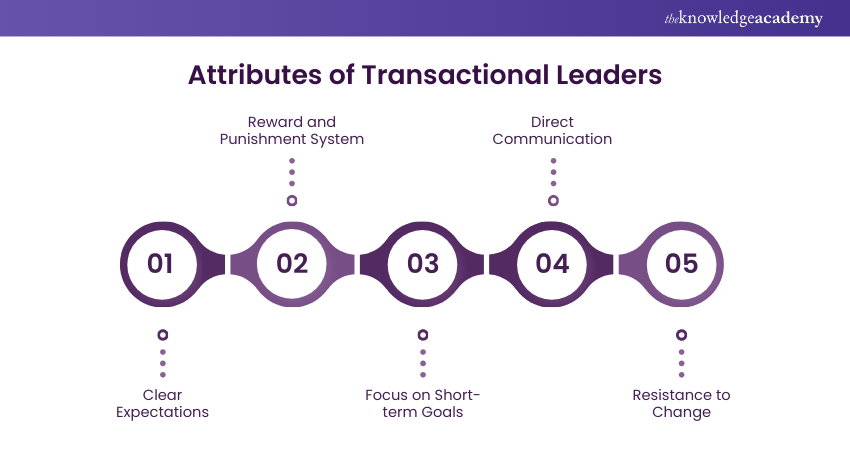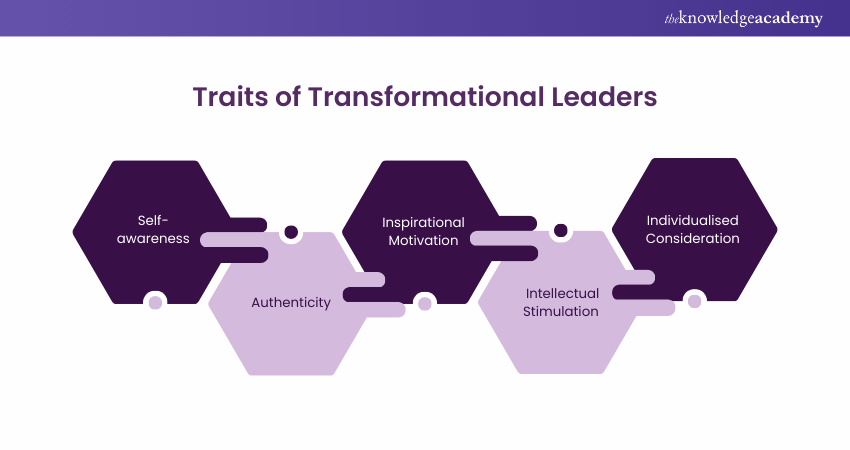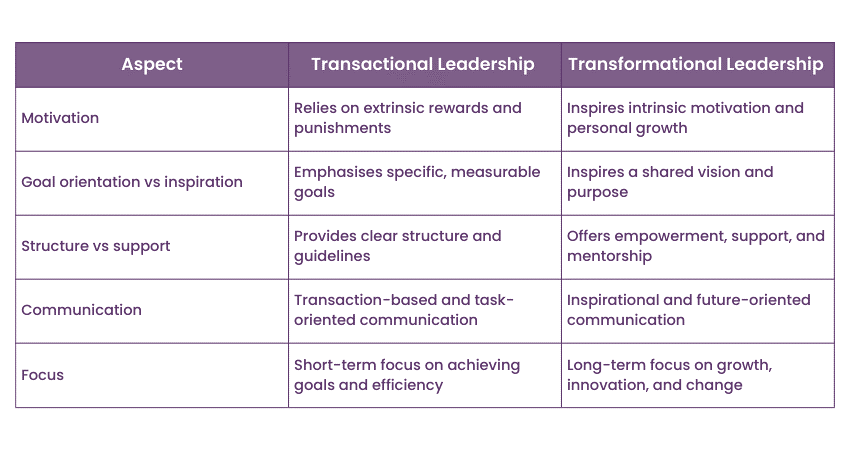We may not have the course you’re looking for. If you enquire or give us a call on 01344203999 and speak to our training experts, we may still be able to help with your training requirements.
Training Outcomes Within Your Budget!
We ensure quality, budget-alignment, and timely delivery by our expert instructors.

Imagine a scenario, where a company is facing a critical project deadline. Given this situation, the Transactional Leader, sets clear goals and offers bonuses for meeting targets. Meanwhile, another team, led by a transformational leader, is encouraged to think creatively and innovate solutions. Which approach would you prefer? In the realm of “Transactional vs Transformational Leadership,” understanding these styles is crucial. Transactional Leadership focuses on structured goals and rewards, ensuring tasks are completed efficiently. Conversely, Transformational Leadership inspires teams to innovate and embrace change, fostering a dynamic work environment.
Wondering, how do these leadership styles impact your organisation’s success? Can blending elements of both create a balanced approach? This blog explores the attributes of “Transactional vs Transformational Leadership,” helping you identify the best strategy to lead your team effectively.
Table of Contents
1) What is Transactional Leadership?
2) Characteristics of Transactional Leadership
3) What is Transformational Leadership?
4) Characteristics of Transformational Leadership
5) Difference Between Transactional and Transformational Leadership
6) Conclusion
What is Transactional Leadership?
Transactional Leadership is a style that centres on the exchange of rewards and feedback between the leader and their followers. The leader establishes clear goals and expectations, offering feedback and incentives based on the followers’ performance. This approach maintains the status quo and avoids risks or changes. Transactional Leadership proves effective when tasks are simple, routine, and well-defined, and when followers are motivated by external rewards or consequences.
Additionally, Transactional Leadership can foster a stable and predictable work environment, which can be advantageous in industries, wherein consistency and adherence to established procedures are crucial. However, this style may limit creativity and innovation, as it discourages taking risks and exploring new approaches. For organisations aiming to drive change and adapt to dynamic environments, a more flexible and visionary leadership style might be necessary.
Characteristics of Transactional Leadership
Transactional Leadership is defined by several key characteristics that distinguish it from other leadership styles. Here are some of the primary characteristics of Transactional Leadership:

1) Contingent Rewards: Transactional leaders incentivise their team members by offering tangible rewards for achieving specific performance goals. This method promotes compliance and often relies on extrinsic motivation, such as bonuses or promotions.
2) Management by Exception: Transactional leaders closely monitor their team’s performance and intervene when deviations from established standards occur. They typically address issues through corrective actions and penalties, reinforcing a culture of accountability.
3) Clarity of Expectations: In a Transactional Leadership environment, team members know precisely what is expected of them, as roles and responsibilities are clearly defined. This clarity can provide a sense of security and predictability.
What is Transformational Leadership?
Transformational Leadership is characterised by four key components: Intellectual Stimulation, Individual Consideration, Inspirational Motivation, and Idealised Influence. These leaders encourage innovative thinking, provide mentorship, instil a shared vision, and act as role models. They focus on nurturing and positively motivating their workforce, fostering an autonomous environment that promotes creativity and empowers employees to make decisions.
This leadership style is particularly effective in organisations prioritising employee development over immediate production targets. It thrives in settings where products or services are novel, requiring open and innovative thinking to navigate new challenges and opportunities. Transformational leaders are especially impactful with younger team members, helping them integrate into the company culture and feel part of something unique.
Characteristics of Transformational Leadership
Transformational Leadership is an approach, which inspires and motivates followers to achieve extraordinary outcomes. Here are some key characteristics that define transformational leaders:

1) Idealised Influence: Transformational leaders work as role models, demonstrating high ethical standards and earning the trust and respect of their followers. They inspire others by embodying the values and behaviours they wish to see in their team, fostering a sense of loyalty and commitment.
2) Individualised Consideration: These leaders pay close attention to the needs and development of each team member. They provide personalised coaching and mentoring, helping individuals to grow and achieve their full potential.
3) Intellectual Stimulation: Transformational leaders foster creativity and innovation by challenging existing assumptions and encouraging new ideas. They foster an environment where team members feel safe to present their thoughts and take risks, leading to continuous improvement and growth.
Drive change and inspire your team by investing in our Agile Leadership Training now!
Difference Between Transactional and Transformational Leadership
Now that we have defined each Transformational vs Transactional Leadership, let's study the difference between them. Here's an in-depth clarification of the difference between Transactional and Transformational Leadership patterns: Image Desc: Transactional Leadership vs Transformational Leadership

1) Motivation
Transactional leaders normally inspire their team members via a procedure of rewards and feedback. They establish clear expectations and performance metrics and praise folks that meet or exceed targets. Punishments or corrective movements are implemented to individuals who fail to meet expectancies. This transactional method hinges on extrinsic motivation.
Transformational leaders in general encourage their team members via intrinsic motivation. They encourage and engage their members by means of attractive to their better-order desires, along with individual development, self-realisation, and a sense of purpose. They build a supportive and empowering environment that encourages individuals to make satisfactory contributions.
2) Goal Orientation vs Inspiration
Transactional Leaders are highly goal-oriented. They set specific and measurable targets for their team members to achieve. These goals are often aligned with the organisation's objectives and may be tied to rewards or bonuses.
Transformational Leaders have a clear vision for the future and effectively communicate this vision to their followers. They inspire and energise their team by articulating a compelling vision which resonates with their values and aspirations.
3) Structure vs Support
Transactional Leaders offer a dependent work surroundings in which roles, duties, and expectations are described. They establish standard running methods and protocols, making sure that personnel adhere to established hints.
Transformational Leaders motivate their team members by delegating responsibilities, presenting autonomy, and growing opportunities for growth and development. They provide help, mentorship, and guidance to help people reach their full ability.
Discover the secrets to effective Leadership with our comprehensive Leadership Skills Training.
4) Communication
Communication in Transactional Leadership is primarily transaction-based. Leaders provide feedback, guidance, and instructions related to specific tasks or goals. They expect team members to follow instructions and meet performance targets.
Communication in Transformational Leadership is inspirational, motivational, and future-oriented. Leaders use storytelling, metaphorical language, and vivid imagery to effectively convey their vision and engage their followers emotionally.
5) Long-term Focus
Transactional Leadership tends to have a quick-time period awareness, emphasising instant effects and assembly goals. The primary objective is to make sure efficient operations and goal fulfillment within the short run.
Transformational Leadership emphasises long-term recognition on organisational growth and improvement. Such leaders concentrate on fostering innovation, promoting a studying lifestyle, and adapting to change. They encourage their team to assume past instant goals and strive for non-stop development.
Conclusion
Amidst the debate of Transactional vs Transformational Leadership, each approach offers unique strengths tailored to satisfy organisational requirements. While transactional leaders excel in retaining order and achieving unique objectives, transformational leaders drive innovation and encourage growth. Understanding those distinctions let you select the right method to lead your team effectively.
Take your Leadership skills to the next level by signing up for our Leadership Training today!
Frequently Asked Questions

Transactional Leadership skills are well-suited for management roles and positions emphasising quality control and compliance. Conversely, Transformational Leadership skills open doors to executive positions, innovation and research roles, entrepreneurship, and human resources and organisational development careers.

Transactional Leadership skills propel career progression through their focus on efficiency, reliability, and financial accountability. On the other hand, Transformational Leadership skills drive professional success by fostering innovation, adaptability, and organisational growth.

The Knowledge Academy takes global learning to new heights, offering over 30,000 online courses across 490+ locations in 220 countries. This expansive reach ensures accessibility and convenience for learners worldwide.
Alongside our diverse Online Course Catalogue, encompassing 19 major categories, we go the extra mile by providing a plethora of free educational Online Resources like News updates, blogs, videos, webinars, and interview questions. Tailoring learning experiences further, professionals can maximise value with customisable Course Bundles of TKA.

The Knowledge Academy’s Knowledge Pass, a prepaid voucher, adds another layer of flexibility, allowing course bookings over a 12-month period. Join us on a journey where education knows no bounds.

Explore Leadership and Management Course with The Knowledge Academy, where more courses await, including Staff Motivation Training, Leadership Skill Training, and Decision Making Training. Tailored for various skill levels, these courses offer in-depth insights into Strategic workforce planning and methodologies.
Dive into our Business Skills blogs a trove of resources covering Leadership topics. Whether you are a beginner or aiming to enhance your Leadership and Management skills, The Knowledge Academy's diverse courses and insightful blogs are your go-to source.
Upcoming Business Skills Resources Batches & Dates
Date
 Successful People Management and Team Leadership
Successful People Management and Team Leadership
Fri 14th Feb 2025
Fri 16th May 2025
Fri 25th Jul 2025
Fri 29th Aug 2025
Fri 10th Oct 2025
Fri 28th Nov 2025







 Top Rated Course
Top Rated Course



 If you wish to make any changes to your course, please
If you wish to make any changes to your course, please


